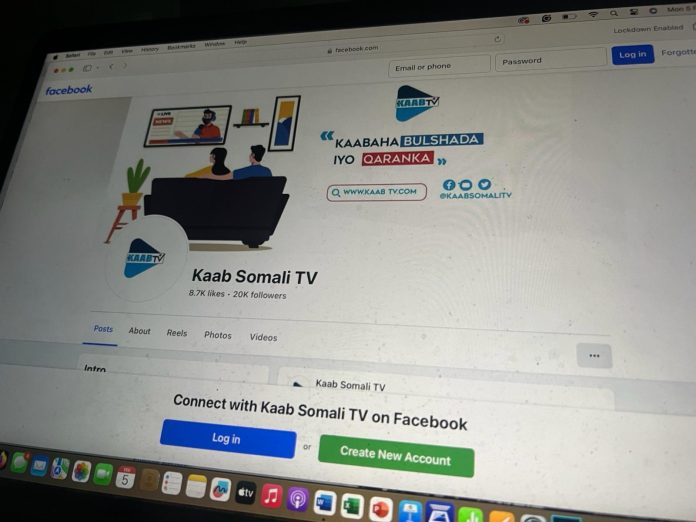MOGADISHU (KAAB TV) – In the fast-evolving digital landscape, social media platforms have become integral tools for communication, networking, and information dissemination.
For Somali IT engineer Ahmed Yusuf, Facebook serves as more than just a platform to share courses and sell IT education; it has become a vital means of engagement with students and customers, eliminating the need for physical meetings.
With over 64,000 followers on his Facebook page, Yusuf exemplifies the platform’s utility in fostering connections in the digital realm.
However, as Facebook marked its 20th anniversary on Sunday, February 4, 2024, it has also emerged as a primary news source for many Somalis, both within the country and in the diaspora.
The statistics reveal a substantial presence, with over 2.6 million Facebook users in Somalia as of April 2023, constituting 15.2% of the entire population, and a majority of them being men (55.7%).
Despite its undeniable impact, concerns loom large over the platform’s safety, censorship tactics, and privacy issues.
University student Abdirisak Ahmed, a Facebook user for seven years, expresses the dichotomy of his experience.
“I use Facebook to connect with friends, university students, and family. But there are a lot of dangerous things as well,” he states, highlighting the vulnerability of personal information to misuse for illicit purposes.
Abdirisak’s fears materialized for political activist Hassan Abdi Gurey, whose Facebook account fell victim to hacking shortly after the presidential election in Somalia in May 2022. Gurey recounts the ordeal: “My Facebook was hacked during the midnight, and hackers were posting bad statements which I did not make at all. I could not regain control over it. I was frustrated.”
For Mohamed Sheikh Nur, a tuk-tuk taxi driver, Facebook serves as a daily source of news, but the constant influx of distressing information has left him disheartened.
“Every morning before I hit the road, I have to check Facebook because nowadays it is the only place where we go for news sources. The bad news is always there; death of people and destruction of lives,” he laments.
While Nur sees little benefit for the younger generation online, he acknowledges Facebook’s dominance as a major news source for Somalis.
Media activists, too, share their concerns. The Somali Journalists Syndicate (SJS) reports instances of Facebook’s mass reporting and community standards being weaponized to censor and suppress Somali journalists.
Mr. Mumin, representing SJS, calls for increased transparency from social media companies. He urges Facebook to clarify its interactions with various governments, including Somali authorities, regarding content censorship. The SJS also advocates for a review of Facebook’s broad definitions of terms like ‘terrorism,’ ‘hate speech and incitement to violence,’ and ‘content that is not allowed,’ aligning them with international standards.
As Facebook continues to shape the digital landscape in Somalia, the platform’s role as a facilitator of connectivity and bearer of news comes with inherent challenges that demand collective attention and action to ensure a safer and more reliable online environment for all users.


